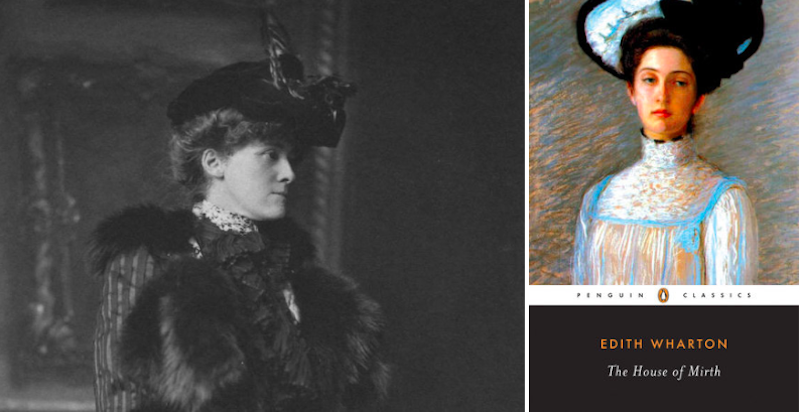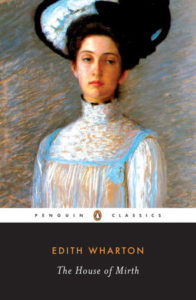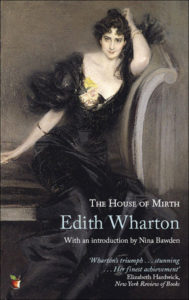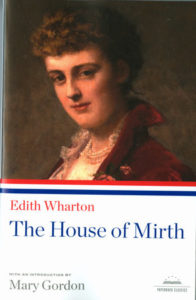

She had no tolerance for scenes which were not of her own making.
*
“If one accepts an invitation to the House of Mirth, it is not to be expected that on entering one will find a group of settlement workers or a society devoted to the promotion of the virtues. The House of Mirth is a chosen abode of those who make the pursuit of pleasure the aim and object of their existence. It is to such a company that Mrs. Wharton invites us when we open the covers of her latest book. It ought to be unnecessary to say that the book does not pretend to represent New York society at large, buy merely one of its element, namely, that group or set to whom amusement and pleasure seeking are the main pursuits of life. That the more admirable types of character which undoubtedly exist in New York society, as they exist in all society, are not present in this book, is a tacit recognition of their absence from the particular circle which is depicted. They would find no pleasure in such a circle, and their presence there would not be desired. We have no more logical right to be surprised at the absence of high purpose and fine character from The House of Mirth than to be surprised at not finding edelweiss in the desert.
The deleterious effect upon human character of unlimited self-indulgence has been recognized ever since the beginnings of recored wisdom. Mrs. Wharton shows us what form this debasement takes as a result of the kind of self-indulgence most in vogue in the circle upon which she has turned her searchlight. So we have in illustration the Dorsets and Trenors, with their inevitable parasites; the unspeakable Rosedale, and then—Lily Bart.
To a normal observer the most pitiable figures in life are the well-bred, impecunious hangers-on of the rich. What life must theirs be! What a sacrifice of self-respect! What an effacement of individuality, of pride, of honor! What a life of lies! And all in order to lie soft and fare well at others’ expense; to live in the limelight, and possibly gain some permanent material advantage or connection. Such is Lily Bart, save that from the first she is hampered by a fibre of inward fineness which ever prevents her making the most of her opportunities, and in the end makes her role of worldling a failure.
…

“A feeling of dissatisfaction is expressed by some readers of The House of Mirth because the characters are not ‘noble.’ Mrs. Wharton is mildly reproached because her book is full of persons whom ‘we would not wish to meet twice.’ Does the merit of a work of fiction depend upon the number of edifying characters which it contains? If so, how did Oliver Twist, Les Misérables, and Vanity Fair gain their hold upon readers.
..
“Somewhat of the irritation and resentment expressed by readers of The House of Mirth is due, I think, to a sort of offended jingoism. If only it were English or French high society in which these unlovely persons figure, the book could be read with an agreeable sense of gratitude that we are not as they are. But, horrors! these people are our very own who are here set forth—the sons and daughters of our Puritan forebears—gambling and telling lies, gossiping away the character of a defenseless woman, selling their social countenance to a repulsive money-monger, making light of the marriage tie; in short, doing all those things which we have been brought up to believe are the peculiar features of high life in foreign lands. To certain worthy citizens it seems hardly loyal to admit that the picture can possibly be true to American life.

“We Americans are a great people, beyond doubt, but among our many qualities we do not number that of a dignified acceptance of merited censure. So much of the criticism which has been leveled at us from distant shores has been unjust and absurd, that we have acquired the habit of indignantly rejecting all criticism and making a fresh catalogue of our virtues each times we are assailed. But now from our own ranks has risen an artist who, with consummate skill and power, has drawn a life picture which we can well afford to thoughtfully consider. We have had good reason of late to realize that the green bay tree of our unparalleled prosperity bears some curious fruit on its topmost branches. Mrs. Wharton exhibits to us some other phases of the same lack of moral fibre in high places.
Let not the prophet be without honor in her own land, and if our flamboyant patriotism must find expression, we may well count among our causes for self-congratulation the fact that this gifted writer is our countrywoman.”
–The New York Times, December 30, 1905

